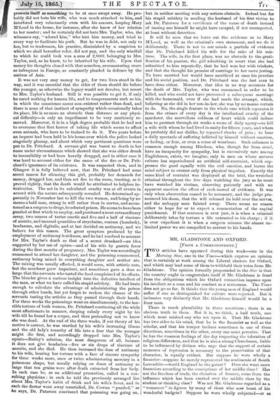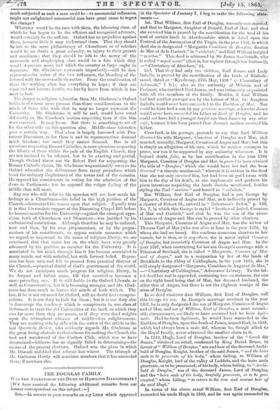T WO articles have appeared during this week—one in the Morning
Star, one in the Times—which express an opinion that is certainly at work among the Liberal electors for Oxford, and which may lead some of them to withhold their votes from Mr. Gladstone. The opinion formally propounded in the Star is that the country ought to congratulate itself if Mr. Gladstone is freed from the obligations which his Oxford connection imposes upon his intellect as a man and his conduct as a statesman. The Times does not go so far. It thinks that the young men of England would suffer if one so distinguished for culture were rejected. But it intimates very distinctly that Mr. Gladstone himself would be a freer man.
There is much plausibility in these assertions ; there is an obvious truth in them. But it is, we think, a half truth, one which must mislead any who act upon it. That Mr. Gladstone has two sides to his mind, that he is the financier as well as the scholar, and that his temper inclines sometimes in one of these directions, sometimes in the other, every one must perceive. That he has the common feelings of the day respecting the toleration of religious differences, and that he is also a strong Churchman, liable to be influenced by divines who urge that the support of certain measures of repression is necessary to the preservation of that character, is equally evident. But suppose he were wholly a financier—suppose he merely represented the sentiments of South Lancashire—would England be the gainer? Does she want mere financiers according to the conceptions of her middle class? Has not the freedom of trade, the elevation of finance, come from the influence which has been exerted over the middle class by the student or thinking class? Was not Mr. Gladstone regarded as a " romancer" in figures by many of those who now boast of his wonderful budgets? Suppose he were wholly subjected—or as
much subjected as such a man could be—to commercial influences, might not enlightened commercial men have great cause to regret the change ?
Whatever would be the case with them, the labouring class, of which he has begun to be the efficient and recognized advocate, would certainly be the sufferer. Oxford has no prejudices against them, however little it may understand them. That they should be left to the mere philanthropy of Churchmen or of scholars would be no doubt a great calamity, an injury to their growth and manliness ; that they should be Ieft to the mercy of the mercantile and shopkeeping class would be a fate which they would deprecate more, and which the country at large ought to deprecate. Mr. Gladstone represents imperfectly—still he does represent—the union of the two influences, the blending of the lettered with the mercantile character. From the combination of these the working class has everything to hope ; if they are separated and become hostile, we hardly know from which it has most to fear.
The danger to religious toleration from Mr. Gladstone's Oxford habits is of course more present than these considerations to the minds of those who wish that he may no longer represent the University. Mr. Gladstone, it will be said, would have voted differently on Mr. Gbschen's motion respecting tests if this bias were removed. It may be so. But there is something to set off for the other side on this question also. Middle-class toleration goes a certain way. That class is largely leavened with Pro- testant Dissenters, so for them it and its representatives demand much freedom ; too much they cannot demand. But in all questions respecting Roman Catholics, in most questions respecting the liberty of those within the pale of the English Church, they are not inclined to be tolerant, but to be exacting and partial. Though Oxford threw out Sir Robert Peel for supporting the Roman Catholic claims, Mr. Gladstone unquestionably owes to his Oxford education the deliverance from many prejudices which beset the ordinary Englishman of the towns and of the counties. He opposed his constituents in voting for the admission of the Jews to Parliament; but he opposed the vulgar feeling of the middle class still more.
Any one who will refer to his speeches will see how much his feelings as a Churchman—his belief in the high position of the Church—determined his course upon that subject. Equally true it is that his resolute support of the Dissenting Chapel Bill before he became member for the University—against the strongest oppo- sition both of Churchmen and Dissenters—was justified by his ecclesiastical convictions. Although therefore he may be induced, now and then, by his own prepossessions, or by the prepos- sessions of his constituents, to oppose certain measures which we regard as important to the cause of religious liberty, we are convinced that that cause has on the whole been very greatly advanced by his position as member for the University. It is associated in his mind, through him it has become associated in many minds, not with unbelief, but with fervent belief. Reprm- sion has been seen and felt to proceed from practical distrust of the Church,—practical denial of God's government of the world. We do not anticipate much progress for religious liberty, in its deepest and fullest sense, till that conviction becomes a more pervading one. It is still feeble in the Oxford Liberals, as well as Conservatives, but it is becoming stronger, and Mr. Glad- stone has done much to leaven the minds of both with it. The loss, if he is not returned for Oxford, will no doubt have compen- sations. It is our duty to look for them ; but it is our duty also to discourage the tendency which is conspicuous in one class of Reformers to treat the old Universities of the land, to which they owe far more than they are aware, as if they were dead weights upon the triumphant advance of middle-class enlightenment. They are working side by side with the writer of the article in the last Quarterly Review, who evidently regards Mr. Gladstone as the great living obstacle to that scheme for making the Church the tool and watchword of the Carlton Club, which was to have determined—hitherto has so signally failed in determining—the course of the present elections. Oxford was the place in which Mr. Disraeli unfolded that scheme last winter. The triumph of Mr. Gathorne Hardy will convince numbers that it has succeeded there, if nowhere else.































 Previous page
Previous page